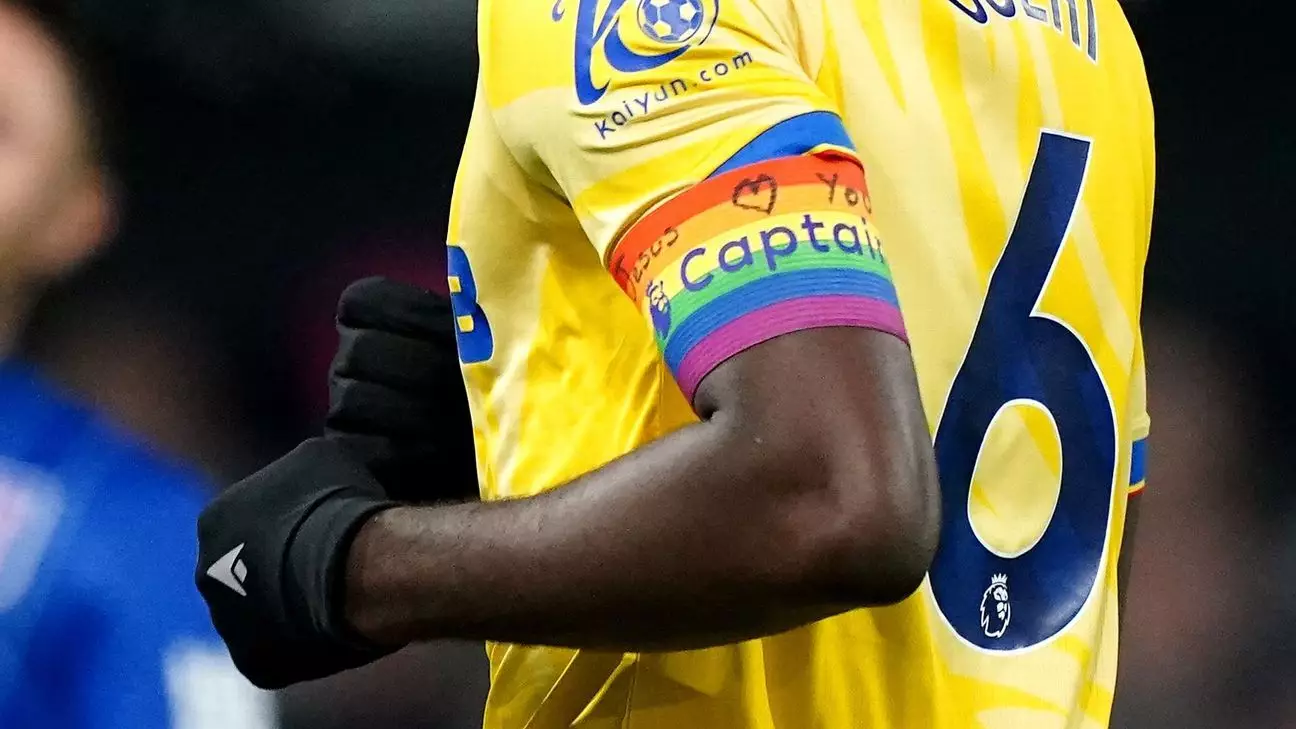The recent actions of Crystal Palace defender Marc Guéhi on the pitch opened a dialogue on faith, expression, and respect for regulations within football. His decision to inscribe religious messages on a rainbow-colored armband designed to promote LGBTQ+ inclusivity raised eyebrows, prompting scrutiny from the English Football Association (FA). This incident not only highlights the challenge of balancing personal beliefs with professional regulations but also underscores the complexities surrounding the intersection of sports, faith, and advocacy.
The backdrop to Guéhi’s actions lies in the FA’s established guidelines concerning what is permissible in football attire. Following modifications made to the Laws of the Game, players are mandated to wear armbands that are free of any slogans or religious messages. A specific focus is placed on maintaining a standard that promotes inclusivity and respect, particularly concerning LGBTQ+ rights. Crystal Palace’s adoption of rainbow armbands symbolizes a commitment to these values, prompting debates about the implications of individual amendments to prescribed attire.
Guéhi, who played a pivotal role in Crystal Palace’s recent 1-0 victory over Ipswich Town, had previously featured the phrase “Jesus loves you” on his captain’s armband. While he was promptly reminded of the regulations following similar actions a match prior, the FA ultimately chose not to impose any formal sanctions against him. This decision raises critical questions about the interpretation and enforcement of rules meant to support inclusivity while also respecting individual expressions of faith.
In the wake of these incidents, Crystal Palace’s manager, Oliver Glasner, offered a nuanced perspective. He emphasized the importance of integration and mutual respect. Glasner’s remarks indicate a recognition of Guéhi’s right to express his beliefs while also supporting the team’s commitment to a broader message of inclusivity. This response demonstrates the delicate balance managers must strike—supporting individual players while adhering to team and league objectives that advocate for diversity.
The point made by Ipswich midfielder Sam Morsy also merits attention. As a practicing Muslim, Morsy chose to forgo the rainbow armband altogether, opting instead for a standard black armband. His decision was accepted without ramifications from the FA, highlighting the notion that cultural and religious beliefs can influence players in various ways, often leading to divergent expressions on the pitch. The FA’s handling of Morsy’s choice indicates a level of sensitivity towards individual beliefs while maintaining a structure to ensure compliance with league guidelines.
As the conversation around Guéhi’s inscriptions unfolds, it serves as a microcosm of a larger issue at play in the realm of professional sports. The push for inclusivity in football has seen a significant evolution over the years, with organizations such as Stonewall leading campaigns to create safer environments for LGBTQ+ individuals. Their mission is echoed by many clubs and athletes, yet when personal beliefs clash with advocacy initiatives, the response is not always straightforward.
Guéhi contended that his message was one of love and inclusivity, a sentiment perhaps meant to bridge divides rather than create them. However, the context in which the message was presented complicates its interpretation. With multiple layers of meaning, both the religious implications and the LGBTQ+ advocacy intersect in ways that necessitate considerate dialogue among players, managers, and governing bodies alike.
Ultimately, Guéhi’s situation serves as a critical reminder of the ongoing journey toward inclusivity in sports. While players possess the right to express their beliefs, navigating the guidelines set forth by governing bodies requires careful thought and sensitivity. The FA’s reminder to Guéhi requires acknowledgment of both his faith perspective and the collective message of inclusivity that football seeks to promote. As conversations continue, it is essential for all stakeholders in the game to engage in respectful dialogue that honors both personal beliefs and the overarching mission of inclusivity within the sport.

